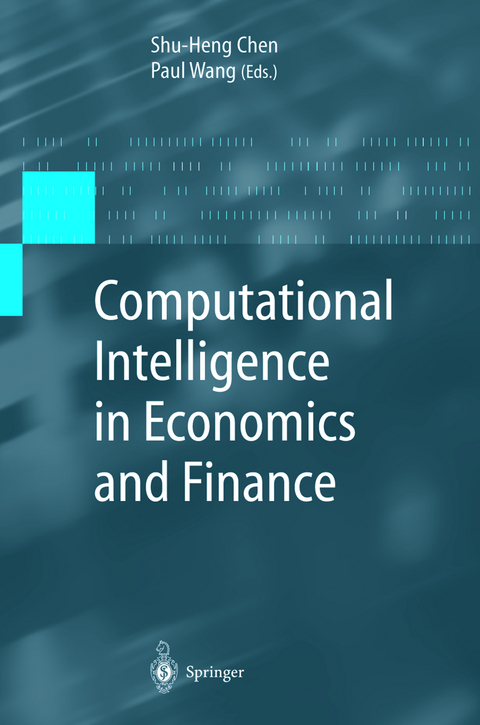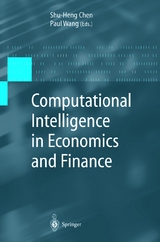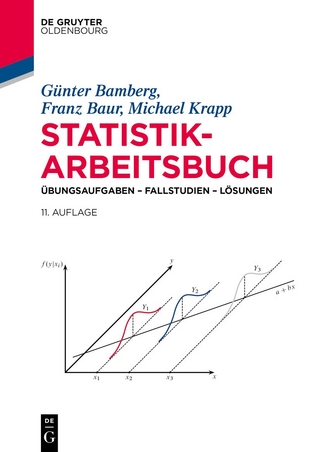Computational Intelligence in Economics and Finance
Springer Berlin (Verlag)
978-3-540-44098-7 (ISBN)
Due to the ability to handle specific characteristics of economics and finance forecasting problems like e.g. non-linear relationships, behavioral changes, or knowledge-based domain segmentation, we have recently witnessed a phenomenal growth of the application of computational intelligence methodologies in this field.
In this volume, Chen and Wang collected not just works on traditional computational intelligence approaches like fuzzy logic, neural networks, and genetic algorithms, but also examples for more recent technologies like e.g. rough sets, support vector machines, wavelets, or ant algorithms. After an introductory chapter with a structural description of all the methodologies, the subsequent parts describe novel applications of these to typical economics and finance problems like business forecasting, currency crisis discrimination, foreign exchange markets, or stock markets behavior.
PAUL P. WANG, PhD, received his doctorate from The Ohio State University and is Professor of Electrical and Computer Engineering at the Pratt School of Engineering, Duke University in Durham, North Carolina. He has published extensively in the fields of mathematical systems modeling, fuzzy logic, pattern recognition, intelligent systems, and the applications of computational intelligence methodologies to the medical and management expert systems design. His work with Masaki Togai during the 1980s led to the fabrication of the first fuzzy logic chips. Dr. Wang has been a member of the board of directors of several corporations, including Intelligent Machine, Inc. He is also the founder and CEO of the Association for Intelligent Machinery.
1. Computational Intelligence in Economics and Finance.- 2. Intelligent System to Support Judgmental Business Forecasting: the Case of Estimating Hotel Room Demand.- 3. Fuzzy Investment Analysis Using Capital Budgeting and Dynamic Programming Techniques.- 4. Rough Sets Theory and Multivariate Data Analysis in Classification Problems: a Simulation Study.- 5. Forecasting the Opening Cash Price Index in Integrating Grey Forecasting and Neural Networks: Evidence from the SGX-DT MSCI Taiwan Index Futures Contracts.- 6. A Support Vector Machine Model for Currency Crises Discrimination.- 7. Saliency Analysis of Support Vector Machines for Feature Selection in Financial Time Series Forecasting.- 8. Searching Financial Patterns with Self-organizing Maps.- 9. Effective Position of European Firms in the Face of Monetary Integration Using Kohonen's SOFM.- 10. Financial Applications of Wavelets and Self-organizing Maps.- 11. Pattern Matching in Multidimensional Time Series.- 12. Structural Pattern Discovery in Time Series Databases.- 13. Are Efficient Markets Really Efficient?: Can Financial Econometric Tests Convince Machine-Learning People?.- 14. Nearest-Neighbour Predictions in Foreign Exchange Markets.- 15. Discovering Hidden Patterns with Genetic Programming.- 16. Numerical Solutions to a Stochastic Growth Model Based on the Evolution of a Radial Basis Network.- 17. Evolutionary Strategies vs. Neural Networks: an Inflation Forecasting Experiment.- 18. Business Failure Prediction Using Modified Ants Algorithm.- 19. Towards Automated Optimal Equity Portfolios Discovery in a Financial Knowledge Management System.- 20. White Noise Tests and Synthesis of APT Economic Factors Using TFA.- 21. Learning and Monetary Policy in a Spectral Analysis Representation.- 22. InternationalTransmission of Business Cycles: a Self-organizing Markov-Switching State-Space Model.- 23. How Information Technology Creates Business Value in the Past and in the Current Electronic Commerce (EC) Era.- Author Index.
| Erscheint lt. Verlag | 16.9.2003 |
|---|---|
| Reihe/Serie | Advanced Information Processing |
| Zusatzinfo | XXII, 480 p. |
| Verlagsort | Berlin |
| Sprache | englisch |
| Maße | 155 x 235 mm |
| Gewicht | 815 g |
| Themenwelt | Mathematik / Informatik ► Informatik |
| Wirtschaft ► Allgemeines / Lexika | |
| Wirtschaft ► Volkswirtschaftslehre ► Ökonometrie | |
| Schlagworte | Ants Algorithm • Artificial Intelligence • Business Forecasting • classification • Databases • Economic Modelling • Finance • Financial Data Mining • Financial Engineering • genetic programming • knowledge management • Modeling • Neural Networks Applications • Pattern Matching • Prediction • Rough Sets Theory • Self-Organizing Maps • Simulation • State Space Modeling • Support Vector Machines • Time Series Modeling • Wavelets • Wirtschaftsinformatik |
| ISBN-10 | 3-540-44098-4 / 3540440984 |
| ISBN-13 | 978-3-540-44098-7 / 9783540440987 |
| Zustand | Neuware |
| Haben Sie eine Frage zum Produkt? |
aus dem Bereich




